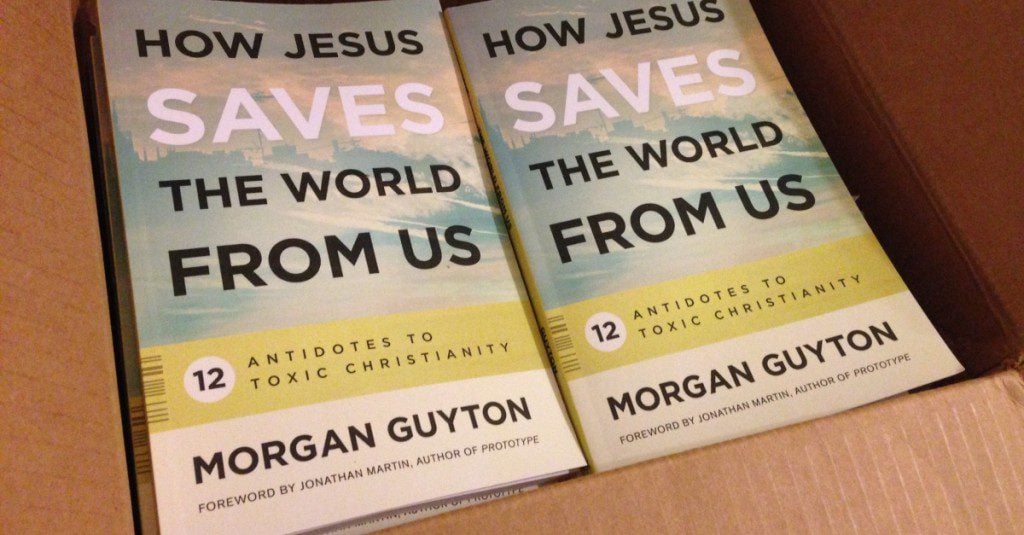I’ve decided to write a series of blog posts focusing on some of the Christian lingo that has become loaded and toxic in our age of culture war. The basic premise of my book How Jesus Saves the World From Us is that Christians fundamentally need to reorient the way we talk about salvation. As I recently blogged, I don’t dispute the existence of hell. But to package salvation as afterlife insurance means tailoring Christian theology to fit the sensibilities of white middle class anxiety. The salvation we read about in the Bible is actually far richer than the tacky door-to-door sales product that toxic Christianity has developed.
My primary text for understanding what Christian salvation looks like is the story of Peter’s first sermon in Acts 2. 3000 people were converted to Christianity upon hearing Peter preach. I don’t think even Billy Graham was able to pull off numbers like that. So what did Peter say that was so compelling? And is there a way to replicate that in our context today? What’s noticeably absent from Peter’s sermon is any mention of hell. Peter’s sermon is utterly unconcerned with the afterlife. His focus is on the legitimacy of Jesus as Israel’s messiah.
The clincher of Peter’s sermon is when he confronts his fellow Israelites with the awful truth that they crucified their messiah: “Therefore let the entire house of Israel know with certainty that God has made him both Lord and Messiah, this Jesus whom you crucified” (Acts 2:36). The text says that the listeners were “cut to the heart” (v. 37) by Peter’s words, which was what motivated 3000 of them to be baptized. After the initial baptism, the text summarizes Peter’s continued exhortation for his listeners: “Save yourselves from this corrupt generation” (v. 40).
This phrase of course reveals how the Biblical text is messier than our Christian doctrine wants it to be. Every good Augustinian Christian knows that we cannot save ourselves because that would be works-righteousness. But the larger point is that what we are saved from is corruption. This needs to be the foundation of our understanding of salvation. Whatever we say about the afterlife is secondary to that. In other words, hell means persisting eternally in the corruption of sin which keeps us from experiencing the incredible belonging of God’s love. Heaven means being liberated from that corruption so that we are able to immerse ourselves fully in communion with God and humanity.
Our narrative of salvation becomes toxic when we act as if the problem is not the corruption of sin itself but God’s punishment for sin. When Romans 1:18 says that “the wrath of God is revealed from heaven against all ungodliness and wickedness of those who by their wickedness suppress the truth,” it then proceeds to talk about the corruption of sin. If wrath referred to a punishment other than the direct natural consequences of sin’s corruption, then we could expect Romans 1 to talk about natural disasters like tornadoes and collapsed bridges by which God punished people for sin. What God’s wrath looks like, according to Romans 1:29, is people who are “filled with every kind of wickedness, evil, covetousness, malice.” In other words, that’s the corruption we are saved from.
Of course, we shouldn’t define salvation purely in the negative. What do peoples’ lives look like after they’ve been saved? Acts 2 again gives us the purest possible answer.
Awe came upon everyone, because many wonders and signs were being done by the apostles. All who believed were together and had all things in common; they would sell their possessions and goods and distribute the proceeds to all, as any had need. Day by day, as they spent much time together in the temple, they broke bread at home and ate their food with glad and generous hearts, praising God and having the goodwill of all the people. And day by day the Lord added to their number those who were being saved. [Acts 2:43-47]
Christian salvation is authentic community built around the wonder and radical trust of pure worship. That’s what heaven looks like. People who are “being saved” are inspired, grateful, and generous to the radical degree of “having all things in common.” They treat everyone outside their community with such genuine kindness that they “have the goodwill of all the people.” Imagine if Acts 2 were what church looked like today. Indeed, there are pockets of nearly every church today that look like this, but too often, it happens in spite of our theology rather than as a natural outgrowth from it.
The grammar of Acts 2 is critical. Salvation is being saved. It’s present tense and it’s ongoing. It’s a process of being detoxified as the Holy Spirit inspires us through the synergy of awestruck, grateful community. In Wesleyan theology, we talk about salvation as the combination of justification (putting our trust in Jesus’ sacrifice for our sins) and sanctification (allowing the Holy Spirit to transform our character). Some people understand justification as an instantaneous transformation and sanctification as the transformative process that follows. My understanding is that our increasing trust in Christ and our increasing transformation by the Holy Spirit are dynamic, mutually reinforcing processes that never stop.
Acts 2 says nothing about how the initial Jerusalem church understood the relationship between Jesus’ cross and their sins. What’s clear is that they trusted God radically enough to sell their possessions and share all things in common. So I would say that Christian salvation isn’t contingent upon having a perfect articulation of what Jesus has done for me. Our grasp of orthodox Christian doctrine is relevant insofar as it increases the trust that allows for transformation.
My recent spiritual journey has exposed me to the 12 step recovery community where trust and transformation occur independent of orthodox Christian doctrine. I haven’t yet figured out what to make of it. But I do think something is lost in building a community around a formula rather than a story and building an identity around the disease I’m trying to avoid rather than a messiah I’m trying to emulate. And yet it works, often way more powerfully than discipleship in communities with pristine, orthodox Christian doctrine. A formula that works is better than a story that has been corrupted by anxious souls and market forces. Regardless, I will never abandon the story in which my savior has destroyed my corruption on his cross and triumphed over it in his resurrection.
I believe that the most potent metaphor for spiritual transformation is to be personally crucified and resurrected with the creator of the universe so that I can be part of the new heaven and new earth that is replacing the toxic world I helped to corrupt. Salvation is citizenship in the new world that is being born whatever that will eventually look like after our mortal bodies have returned to the dust of the earth.
Subscribe to our podcast Crackers and Grape Juice!
Like my author page on Facebook!

















